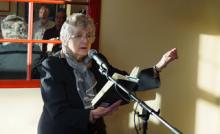poetry
Now the train,
The Dark World
"We are the hollow men." Eliot.
Poet Afterwards
Odd how your not being here this morning
East Coast -- Canada
Lying at night poised between sleep and waking
Poem
In the laquer from the blazing pyramid of branches
Woodcut Fiddlhead
Statement of Position
I walk no lonely roads, climb no mountains
Congratulations to M. Travis Lane on a Governor-General's Award Nomination
Posted on October 8, 2015
By Shane Neilson
[Editor's note: In honour of M. Travis Lane being shortlisted for the Governor General's Literary Award for poetry, we're pleased to reprint with permission Shane Neilson's introduction to the retrospective of her work that appeared in last summer's poetry issue, No. 260, Summer 2014.]
Poetry & Techno: May Their Futures Meet at the Beat? (Part 3 of 3)
Posted on July 23, 2015
By Steven Suntres In my mind, the palate for both techno and poetry is a massive suggestion for the two to fuse together and to create on a blank canvas. I foresee an opportunity, both in content and cultural relevance, to create something that is beautiful and authentic in both of these mediums coming together. They are both emotional experiences that could synthesize into a superpower of an emotional medium.
Poetry & Techno: May Their Futures Meet at the Beat? (Part 2 of 3)
Posted on July 21, 2015
By Steven Suntres With electronic music’s meteoric rise over the past decade, the culture infiltrated the mainstream conscious, which came with its faults but ultimately benefited the culture as a whole. Techno became a cultural force taking over the lifestyles of the party demographics all over the continent. . . .











